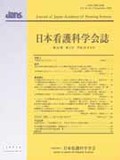Japanese
English
- 販売していません
- Abstract 文献概要
- 参考文献 Reference
- サイト内被引用 Cited by
要旨
目的:本研究では,レビー小体型認知症(以下,DLBとする)患者の家族介護者が生活の常態化を体得する過程を明らかにする.
方法:レビー小体型認知症患者の家族介護者11名に対し半構造的面接を実施し,質的帰納的方法にて分析した.
結果:DLB患者の家族介護者は,最初に,まるで実在するかのような幻視,妄想といった患者の異常な事態に出会い,これらの異変に振り回される【鮮明な精神症状による翻弄】を体験していた.その後,家族介護者は徐々に患者の言動や自分の置かれている状況を,自分なりに解釈して理解しようとする【状況の解釈的理解】を示すようになる.この【状況の解釈的理解】を基盤として,その後さらに家族介護者が介護に向かう姿勢を模索し,自分なりに状況に対処して介護しようとする【より自然であることへの対処】を身に付けていた.
結論:DLB患者の家族介護者における生活の常態化は,病状の進行に伴う不安定なバランスの中で安定した介護生活を維持するために,家族介護者が体得していくものと考えられた.
Abstract
Objectives: This study's aim was to clarify the process of learning normalization of life among family caregivers of dementia with Lewy bodies(DLB) patients.
Method: Semi-structured interviews were conducted with 11 family caregivers of patients with DLB. Interview data were qualitatively and inductively analyzed.
Results: First, participants were met with [bombardment by vivid psychiatric manifestation], that is, they encountered abnormal symptoms, including visual hallucinations or delusions, which they had never seen before, and confounded them. Subsequently, family caregivers gradually showed [interpretative understanding], that is, they tried to interpret and understand patients' strange behaviors and situations in their own way. Furthermore, family caregivers became able to [cope more naturally], that is, they struggled to develop an attitude toward care based on an interpretative understanding and tried to cope with situations in their own way.
Conclusions: These findings suggest that the normalization of life of family caregivers of patients with DLB can allow them to continue to provide care to patients who have an unstable condition.
Copyright © 2013, Japan Academy of Nursing Science. All rights reserved.


